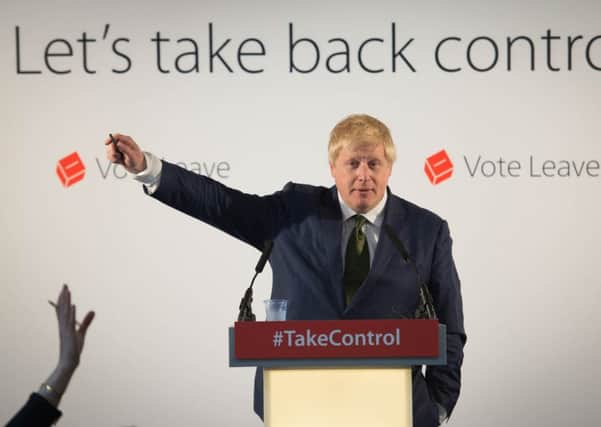YP Comment: PM v Boris: Let them debate EU. Time to stop the negative tactics


Strong on rhetoric and lacking the nitty-gritty clarity that undecided voters have been seeking for weeks, cynics might argue that these two speeches had more to do with the future Tory leadership rather than Britain’s role in Europe.
And this is the point – both campaigns seem more comfortable rubbishing the policy positions adopted by their opponents rather than making a positive case in favour of EU membership or explaining how British business will actual function, and prosper, if the UK votes for Brexit.
Advertisement
Hide AdAdvertisement
Hide AdPerhaps both men should be focusing more on their own campaigns given the extent to which last week’s local election saw a public backlash against Conservative smear tactics after the party vilified the reputation of opponents ranging from Labour’s Sadiq Khan, who became Mayor of London, to former police officer Keith Hunter who defeated Tory incumbent Matthew Grove in a bitter fight to become Humberside’s crime commissioner.
One way forward would be for the Prime Minister and Mr Johnson, the former Mayor of London, to put their statesmanlike qualities on the line by engaging in a head-to-head TV debate moderated by respected experts. Though Mr Cameron does not favour such forums after a bruising experience in 2010 at the hands of Gordon Brown and Nick Clegg, he should also have nothing to fear from this exercise in democracy if he believes he is on the right side of the Europe argument.
A force for good: Prince Harry and Invictus Games
PRINCE HARRY’S commitment to the Invictus Games provides a timely riposte to those republicans who used the Queen’s 90th birthday to question the future of the monarchy. Here is a former war veteran committed to championing the needs of those service personnel injured in the line of duty so they’re not left on society’s scrap heap.
It’s not just about those soldiers who lost limbs in Iraq and Afghanistan – Prince Harry spoke powerfully at the opening ceremony of the Invictus Games in Florida about the need to do more to help those struggling with the unseen psychological trauma of battle.
Advertisement
Hide AdAdvertisement
Hide AdThe fact that such an influential individual was prepared to speak so candidly about post-traumatic stress will, hopefully, mean fewer veterans suffering in silence in the future and being more willing to contact those charities that specialise in this field. Military personnel should not be too proud to ask for help – to do so should be regarded as a strength of character rather than a sign of weakness.
Despite Defence Secretary Michael Fallon concurring, more needs to be done and it is particularly disappointing that the courts have now upheld the Government’s decision not to help with the resettlement of two former interpreters who risked their lives working alongside British forces in Afghanistan. Given the assistance that the UK has given to Iraqi interpreters, this smacks of double standards and is totally at odds with Britain’s new-found respect for all those who have gone to war on this country’s behalf. Perhaps Prince Harry can add this to his “to do” list.
Hull remembers: The forgotten ‘North East’ town
THE vibrant Hull of today is unrecognisable from the forgotten city of 75 years ago when it lay in ruins after bombing raids by the Luftwaffe on successive nights left 420 people dead and 350 seriously injured.
Yet, as Hull looks forward to next year’s City of Culture celebrations which will showcase the area’s renaissance, it is acutely aware that the events of May 1941 were a defining moment in its history.
Advertisement
Hide AdAdvertisement
Hide AdFor many years, the story of the Hull Blitz could not fully be told because the port city was a strategically important location and Winston Churchill did not want to hand a propaganda coup to the Germans. Censorship meant that in contemporaneous reports it was usually referred to as a “North East town” – The Yorkshire Post carried a front page report on May 9, 1941, with the headline “North-East Heroism” – and this restriction meant that Hull’s plight, and the consequences for its residents, did not get the attention that it merited.
The tragedy is that it took so long for this to be rectified. If the city’s losses had been acknowledged sooner, Hull may not have spent so long in the economic doldrums.